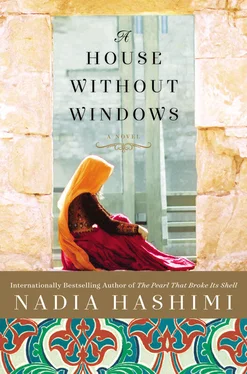Nadia Hashimi
A House Without Windows
For Cyra — our dazzling beam of love
The message, the rain, and the divine light come through my window
Falling into my house from my origins
Hell is that house without a window
True religion, O servant of God, is creating a window
Do not raise your ax to every nook, come
Raise your ax to frame a window
Do you not know that sunlight
Is only the image of the sun that appears beyond her veil?
— RUMI, MASNAVI III, 2403–2406
I SUPPOSE THIS BLOODY MESS MIGHT PARTLY BE MY FAULT. HOW could it not be? I lived with the man. I salted the food to his taste. I scrubbed the dead skin off his back. I made him feel like a husband should.
He did a few things for me, too. He would sing to me, something between a song and an apology, whenever I was most upset. I could never stay mad then. Something about the way his eyebrows danced or the way his head bobbed. . he was like ice to my hot moods. I would curl up against him just to feel his breath tickle the back of my neck.
To think that it all would come to an end just a few feet from where we’d lain together as husband and wife. And only steps away from where unholy blood had been spilled before. Our little yard with a rosebush in one corner and a clothesline running across it — it has been the theater of much gore in the last year. I question the sanity of the roses that still dare to bloom there.
Those roses are deep red and would look lovely on a grave. Is that an odd thought?
I think most wives imagine their husbands dying — either out of dread or out of anticipation. It’s an inevitability. Why not guess at how or when it might happen?
I’d imagined my husband dying a million different ways: as an old man with his children at his bedside, shot in the head by insurgents, keeled over with his hands on his unticking chest, struck by lightning on his way to somewhere he shouldn’t have been going. The lightning was always my favorite. Allah, forgive me for my colorful imagination. I blame my mother for that lovely bit of inheritance. Lightning would have been easier on everyone — a shocking and poetic little bolt from the heavens. It would have hurt, but only for an instant.
I hate to watch anything suffer.
No, I never imagined my husband dying the way he did, but what’s a wife to do? Thunderstorms don’t show up when you need them.
Since I was a young woman I’ve managed to hold myself together by stringing words into rhyme, creating order and rhythm in my head when there was none to be found in my world. Even now, in this miserable state, my mind turns a verse.
My full height, my beloved husband never did see
Because the fool dared turn his back on me.
IF ZEBA HAD BEEN A WOMAN LESS ORDINARY, KAMAL MIGHT HAVE seen it coming — a gnawing feeling or at least a few hairs standing on end. But she gave him no warning, no reason to believe that she would be anything more than she had been for the last two decades. She was a loving wife, a patient mother, a peaceful villager. She did nothing to draw attention to herself.
On that day, the day that changed an unchangeable village, Zeba’s afternoon was a bland repetition of the many afternoons before it. The clothes hung on the line outside their home. Stewed okra simmered in an aluminum pot. Rima, the puffy tops of her feet blackened from crawling around the house, slept a few feet away, a dark, wet circle where her innocent mouth met the bedsheet. Zeba watched her daughter’s back rise and fall and smiled to see the soft pout of her lips. She traced her finger through a mound of freshly ground cardamom. The scent lingered on her fingertip, sweet and soothing.
Zeba sighed and flicked the end of her white head scarf over her shoulder. She tried not to wonder where Kamal was because that inevitably led to wondering what he was doing, and Zeba was in no mood to entertain such thoughts today. She wanted today to stay an ordinary day.
Basir and the girls were on their way home from school. Basir, Zeba’s eldest son, was only sixteen years old but more hardened than other boys his age. Adolescence had gifted him with the unfortunate insight to see his parents for what they were. Home had not been a refuge. Home had been, for as long as Basir could remember, a broken place — broken dishes, broken ribs, broken spirits.
At the heart of the problem was Kamal, Zeba’s husband, a man who had disintegrated over the years. Now he survived only by believing that the man he was for minutes at a time could make up for the man he was the rest of the hours.
Zeba watched the embers flicker beneath the pot. Maybe Kamal would bring home a cut of meat today. They hadn’t had any in half a month. Last week, he’d brought a bag of onions, so fresh and sweet Zeba’s eyes had watered just looking at them. She’d cried tears of gratitude into everything she cooked for days.
Rima shifted languidly, her pale leg twisted back under the knit blanket and her arm pulled back to her side. She would be waking soon. Zeba brushed the cardamom grinds into a small empty jar. She took one deep breath before sealing the lid, letting its scent tingle her lungs.
Some days were difficult. Food was often scarce and the children sometimes ill. Zeba had already lost two little ones and knew just how easily God could take away. Kamal had moods she didn’t understand, but she’d learned to weather them, like an experienced pilot navigating through stormy skies. She numbed herself with housework. She focused on the good. The girls were attending school. Basir, her first and only son, was bright, and his help around the house was a relief to her aching back. Rima, the baby, had survived illnesses that had claimed others before her, and her pink cheeks buoyed Zeba’s spirit.
Rima. Incredibly, it was the youngest of the household who changed the course of history. Most children had to start walking before they could do such a thing.
Had Rima not shifted her leg at that moment, had the scent of cardamom not breathed life into Zeba’s weary lungs, had there been anyone else around to see or stop her, perhaps the life that transpired in their humble courtyard and within the solitude of their mud walls would have continued on for another year, another decade, or their entire lives. As it were, a soft breeze drifted through the open window and Zeba thought it best to bring the laundry in before Rima awakened, before Basir and the girls came home.
Out the back door, into the courtyard, and over to the clothesline where she stood for a few moments before hearing something she couldn’t deny.
It was the kind of sound no one wanted to hear. It was the kind of sound people would much rather walk away from.
Zeba’s chest tightened. A white heat flushed her face and made her jaw clench tightly on a day that could have been so wonderfully ordinary. Zeba debated for a moment before deciding she — a wife, a woman, a mother —had to see.
BASIR AND HIS SISTERS ENTERED THROUGH THE GATE IN THE clay wall that separated their home and courtyard from the street and neighboring houses. At the sound of Rima’s wailing, the cry of a child with outstretched arms, Basir’s stomach lurched. The girls hurried into the house and, in a flash, Shabnam had Rima balanced on her narrow hip, the baby’s face runny and red. Kareema looked at her sisters wide-eyed, the smell of burnt okra thick and ominous in the air. There was no sign of Madar- jan . Something was wrong.
Basir said nothing to the girls. He scanned the two bedrooms and the kitchen quickly. He felt his hands tremble as he reached the back door. Pantaloons, head scarves, and shirts flapped on the clothesline. A soft whimper pulled Basir’s attention to the far corner of their courtyard, where the outhouse backed against the neighbor’s outer wall.
Читать дальше











